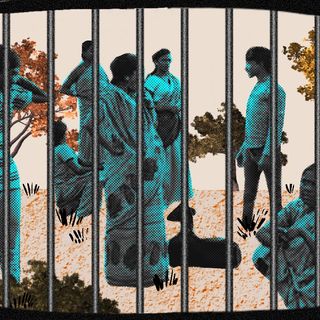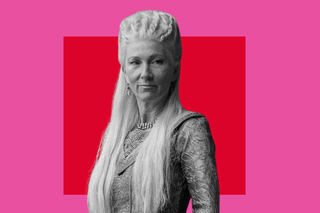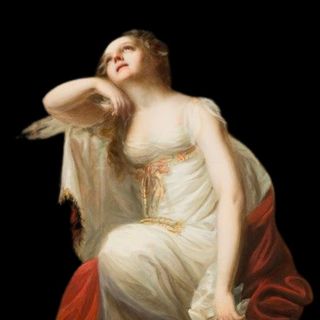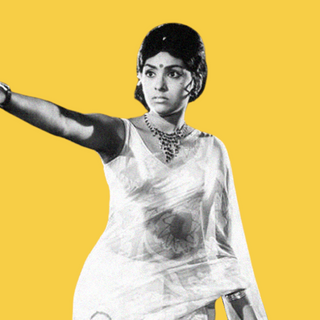
‘House of the Dragon’ Undermines the Centrality of Women in Narratives About Power
It’s a disservice to a story so invested in power at its core, to have so few women even speaking — let alone speaking about it.

This article contains spoilers for season 1, episode 2.
Stories about power aren’t just nothing without women driving them. They’re boring — and that’s the worst offence of all. Women’s anger, injustice, and machinations give power politics their edge — and without edge, fantasy stories are just testosterone-fuelled sword swinging contests, a fate that could well befall House of the Dragon.
In the world of Westeros (and beyond), women and girls have often been moved around like chess (or cyvasse, if you will) pieces. Rarely have the women themselves moved the pieces, even if they occupy seats of power; this has been the preserve of king (or queen) makers who, inevitably, are men in small councils, where the power really resides. The intrigue of Game of Thrones (in the early seasons) was in the way the women understood and leveraged soft power — leading to secret plots, bloodlines, prophesies, and betrayals that kept the wheels turning. Recall Cersei Lannister’s unforgettable quip: “Tears aren’t a woman’s only weapon. The best one’s between your legs.” It’s not the most feminist thing to say, but it’s what makes her TV’s most compelling villain, because it understands how women leverage power to move the pieces themselves.
In a bid to make feminist statements, stories attempt to blandly fit women within pre-existing structures of power. Any promise that a woman might make to break those structures rings hollow — given how this turned out in Game of Thrones. In House of the Dragon, there are many women who are involved in these masculine power games, but just one single girl with any self-recognized agency to speak of so far. It’s a disservice, then, to a story so invested in power at its core, to have so few women even speaking — let alone speaking about it.
If women are essential to chart the fate of kingdoms, there ought to be more dialogue shown to be taking place between them. Not only that, there ought to be more attention paid to their interior worlds — and less hesitation in exploring vindictiveness, resentment, jealousy, and revenge-fuelled death drives in women. With the way history and its players have treated them, it should be surprising if even one of them isn’t consumed by some version of this anger, leading to machinations against the grain of what’s expected. But in the second episode of House of the Dragon, there’s much rumination over power and duty, but a glaring absence of plots involving those who are arguably most central to power: women.
“Men would sooner put the realm to the torch than see a woman ascend to the Iron Throne,” a disgruntled Rhaenys Targaryen tells Rhaenyra, whom we left in the previous episode as the named heir to the Iron Throne. Rhaenys is her aunt who was deprived of the same opportunity, having lost out to a younger cousin, Rhaenyra’s father, who secured the top job on account of being a man. This should have caused narrative tension. A scene from the premiere set up a moment where Rhaenyra is referred to as the “Queen who never was” in front of an entire tourney audience — but there’s never any visible pay-off from this moment. This one-liner is the only memorable moment of hers two episodes into the season — a wasted opportunity for a character rich with potential to drive forward the plot with suspense, intrigue, and most importantly, stakes.
Despite the public slight Rhaenys makes no moves to act upon it. There’s a case to be made for her having become too bitter, cynical, and disillusioned about politics to even bother with it all. But where House of the Dragon falls short is in realizing that political strategizing and alliances aren’t just the domain of robed men behind closed doors; the best-laid plans are indeed undone by the women kept out of the rooms and out of power. So far, Rhaenys appears to be a passive side character more than a formidable player in the game. She simply accepts her fate as the queen who never was, just as she accepts her twelve-year-old daughter being bartered with King Viserys in exchange for securing a direct bloodline to the throne.
Related on The Swaddle:
‘House of the Dragon’ Could Either Redeem or Repeat Fantasy Genre’s Girlboss Heroine Problem
And yet, the second episode is full of power negotiated over women’s bodies. King Viserys is offered a prepubescent girl to strengthen the realm; his brother Prince Daemon makes a manipulative power-grab by falsely announcing his marriage to his favored prostitute and her pregnancy; Alicent Hightower, the daughter of the Hand of the King, Otto Hightower, is nudged by her own father into the King’s bedroom; and finally, a treacherous alliance is forged over the “Sea Snake” being betrayed by the King, when the latter passed over his (might we emphasize, twelve-year-old) daughter for a slightly older girl. All of these moves determine the fate of the kingdom and its people. When Viserys chose one girl over another, the consequences he set in motion are the Westerosi equivalent of near nuclear-war thanks to a spurned Master of Ships egging the episode’s titular “rogue prince” on to prove himself by using his dragon.
A better show may have understood that when women’s bodies are traded to forge alliances and draw battle lines that determine the fate of millions, more than one woman is bound to do something about it. But there’s just one — the protagonist — who does. In a scene laced with tension that cuts, Rhaenyra disobeys her father to arrive at Dragonstone on dragon-top to negotiate with her uncle without bloodshed. She does so through mutually assured destruction — a dragon for a dragon, and countless lives — that act as a deterrent. It’s a rewarding scene, especially when she walks away from it with a victory, having proven that violence can be avoided when it is strategically deployed.
But there is no other woman who is equal to her yet — and if there are, they haven’t yet shown themselves. When they speak, it’s usually to drive forward the plot of men, not the plot itself. Alicent Hightower is visibly sad and fragile for being made to seduce a grieving older man to secure her House’s place. Rhaenys is disillusioned but largely indifferent to her daughter’s trade (“like a broodmare,” as Cersei bitingly notes in Game of Thrones). And Laena (the daughter in question) is twelve and uncomfortably states that she wouldn’t have to “bed” the King until she was fourteen. There are more than two unnecessary expository scenes with the King taking marital advice from his small council members — individually. It’s essentially the same conversation had many times over, adding nothing to the plot, characterization, or atmosphere. Think what a scene between Rhaenys and her daughter Laena could have been like instead — where both characters’ trepidation, dissatisfaction, and even fear could have added substance, risen the stakes, and critiqued power from within. The lack of this and other such scenes shows how House of the Dragon forgets that the most riveting stories are the ones about how those who operate from positions of powerlessness — mostly women — negotiate with power anyway.
In none of the existing scenes with the women/girls do we understand whether any of them have conflicts and inner schemes of their own. The trailer of the show offers promise on that front — there are clear lines of separation between Alicent, on the one hand, and Rhaenyra, on the other, with both women holding clashing interests over the throne. Rhaenys seems to whisper into the former’s ears to prevent her niece’s succession — but in the hullaballoo over which woman can plausibly sit on the throne, the narrative forgets to account for women negotiating with power in ways that don’t merely make them aspire to men’s roles, but to also subvert power in the ways that only women can.
In other words, having women compete for the throne in the same way that men do doesn’t make for particularly engaging lore. It may look feminist at the outset to have women aspire to power that wasn’t meant for them — but it’s a shallow reading of women’s stories to assume that their aspirations are just as staid and predictable as any other man’s.
There’s a single moment of tenderness, foreshadowing the tragedy of forged kinship between girls being rent apart by power-play and politics. It’s between Alicent and Rhaenyra, who talk in a sept lit up by prayer candles. “Mine own father does not understand the language of girls either. When I wish to talk with him, I know that I must make the effort,” says Alicent, when her friend laments not being taken seriously. But the “language of girls” in question isn’t fleshed out beyond the one reference to it. What does it mean for girls — and women — to speak to and in the language of power? Does power itself reside in the language of girls, and are men yet to understand? These are questions that remain unanswered — all in the bid to find out if women can find a place in power as it’s been defined and written by men.
Rohitha Naraharisetty is a Senior Associate Editor at The Swaddle. She writes about the intersection of gender, caste, social movements, and pop culture. She can be found on Instagram at @rohitha_97 or on Twitter at @romimacaronii.
Related


It’s Okay: To Live in Denial Sometimes
